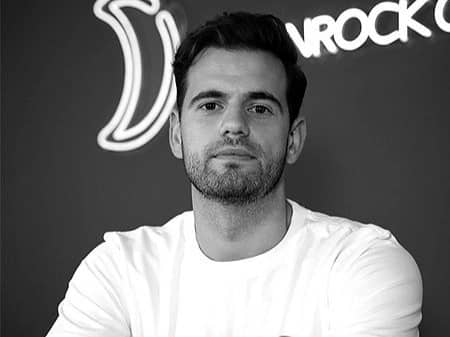위키 구독하기
Share wiki
Bookmark
Simon Dedic
0%
Simon Dedic
사이먼 데딕은 독일의 벤처 캐피털리스트로, Web3 및 암호화폐 분야에 집중하는 독자적인 펀드인 문록 캐피털의 설립자이자 매니징 파트너로 알려져 있습니다. 그는 또한 업계 동향, 시장 분석, 주요 암호화폐 거래소의 관행에 대한 저명한 공개 논평가입니다. [1] [2]
경력
사이먼 데딕의 암호화폐 산업에 대한 전문적인 참여는 2017년경에 시작되었습니다. [2] 2019년에 그는 독일 뮌헨에 기반을 둔 암호화폐 네이티브 벤처 캐피털 회사인 문록 캐피털을 설립했습니다. 회사의 CEO이자 매니징 파트너로서 그는 100개 이상의 초기 단계 Web3, 블록체인 및 암호화폐 스타트업에 대한 투자 및 인큐베이션을 감독했습니다. 이 회사는 독자적인 펀드로 운영되며 해당 분야의 프로젝트를 지원하고 가속화합니다. [1] [3]
2025년 4월 17일, 데딕은 문록 캐피털이 온체인 투자 플랫폼 에코에 그룹 리더로 합류할 것이라고 발표했습니다. 이 이니셔티브는 회사의 개인 거래 흐름에 대한 접근성을 민주화하여 커뮤니티 구성원이 초기 단계 투자 기회에 참여할 수 있도록 설계되었습니다. 데딕은 이번 조치가 암호화폐 산업의 커뮤니티 중심 정신을 회복하기 위한 것이라고 밝혔습니다. 그는 결정에 대해 설명하면서 "Web3 네이티브 프롭 펀드로서 이는 당연한 일입니다. 커뮤니티는 항상 암호화폐의 핵심이었으며, 이제 사람들을 제자리에 돌려놓을 때입니다."라고 말했습니다. [1]
공개 논평 및 견해
데딕은 소셜 미디어와 인터뷰를 통해 암호화폐 시장과 그 발전에 대한 분석과 의견을 자주 공유합니다. 그의 논평은 시장 심리, 투자 철학, 특정 산업 동향에 대한 비판을 다룹니다.
시장 분석
2025년 2월, 데딕은 암호화폐 시장을 "불확실한 단계"에 있다고 설명했으며, 이는 되돌아보면 결정적인 순간으로 여겨질 것이라고 믿었습니다. 그는 벤처 캐피털리스트, 설립자 및 기타 업계 내부자들 사이에서 전례 없는 수준의 분열과 두려움을 언급하면서 시장의 미래 방향에 대한 의견이 그 어느 때보다 분열되었다고 말했습니다. 그는 많은 참가자들이 전략적 오류로 인해 공간을 떠나거나 어려움을 겪고 있는 반면, 다른 사람들은 다가오는 알트코인 시즌에 대해 여전히 확신하고 있다고 관찰했습니다. 데딕은 이 기간을 주요 VC, 시장 조성자 및 거래소와의 대화에서 얻은 통찰력을 바탕으로 "승자와 패자를 가르는" 기간으로 특징지었습니다. [3]
인프라 및 소비자 애플리케이션
데딕은 사용자 대면 제품에 집중하기 전에 인프라를 완전히 구축하는 기존 산업 접근 방식에 반대했습니다. 그는 이메일과 같은 애플리케이션이 인터넷의 기본 기술과 함께 생성된 인터넷 개발에 비유하여 소비자 애플리케이션과 인프라의 병행 발전을 옹호합니다. 그는 벤처 캐피털 부문이 인프라 프로젝트에 자금을 지원하는 경향을 비판했으며, 이를 "VC 서클저크 인프라 라운드"라고 설명했습니다. 데딕은 VC가 암호화폐 생태계에 진입 장벽을 낮추는 애플리케이션에 자금을 지원하여 새로운 사용자를 온보딩하는 데 "책임"이 있다고 믿습니다. [4]
소셜파이
데딕은 소셜파이(Social Finance) 부문에 대해 낙관적인 전망을 표명했지만 초기 모델에 대해서는 비판적이었습니다. 그는 이 공간의 주요 문제점을 "모든 것의 투기와 금융화"에 대한 역사적 초점으로 지적하면서 금융 요소가 소셜 애플리케이션의 핵심 목적이 아닌 기능이 되어야 한다고 주장했습니다. 그는 "암호화폐 레일에서 새로운 소셜 경험을 창출"하고 사용자를 위한 유틸리티를 우선시하는 프로젝트 개발을 옹호했습니다. 그의 견해로는 파캐스터와 같은 일부 플랫폼은 "너무 이상적"이며 기존 Web2 플랫폼과 매우 유사했습니다. [4]
특정 자산 및 동향
데딕은 다양한 암호화폐 및 시장 동향에 대한 공개 논평을 제공했습니다. 그는 2024년 11월에 이더리움 (ETH)을 중요한 투자 기회로 설명하면서 일관되게 낙관적인 입장을 유지했습니다. 2025년 3월, 그는 ETH가 ETH 상장지수펀드(ETF), 기관 스테이킹 및 새로운 DeFi 활동의 잠재적 영향력을 언급하면서 다른 주요 암호화폐보다 뛰어난 성과를 낼 것이라고 예측했습니다. 그는 또한 ETH의 가격이 2017년부터 기술 및 생태계 개발에 비해 저평가되었다고 주장했습니다. [2]
반대로 그는 밈코인에 대해 강한 부정적인 의견을 표명했습니다. 2024년 10월, 그는 그것들을 "이 공간에서 일어난 최악의 일"이라고 부르면서 외부인이 암호화폐 산업에 대해 갖는 회의론에 기여한다고 제안했습니다. 그는 또한 2025년 6월에 하이퍼리퀴드($HYPE) 토큰의 시가총액이 500억 달러에 육박한 후 프로젝트 자체에 대한 감탄을 표했음에도 불구하고 위험-보상 비율에 대한 우려를 제기하는 등 특정 프로젝트의 가치 평가에 대해 공개적으로 의문을 제기했습니다. [2]
논란
데딕은 암호화폐 산업 내 주요 기업의 관행과 관련하여 공개 토론을 시작하고 직접적인 주장을 제기했습니다.
바이낸스 상장 수수료 주장
2024년 10월 31일, 데딕은 소셜 미디어 플랫폼 X(구 트위터)에서 암호화폐 거래소 바이낸스의 상장 수수료 관행에 대해 공개적으로 주장했습니다. 그는 거의 9자리의 자금을 조달한 "Tier 1 프로젝트"가 1년 이상의 실사 끝에 바이낸스로부터 상장 제안을 받았다고 주장했습니다. 데딕에 따르면 거래소는 상장 수수료로 프로젝트 총 토큰 공급량의 15%를 요구했습니다. 그는 이 수수료의 가치를 5천만 달러에서 1억 달러 사이로 추정했습니다. 데딕의 게시물은 중앙 집중식 거래소의 상장 관행에 대한 광범위한 산업 논쟁을 촉발했습니다. 이 주장은 상장 수수료를 부과하지 않는다는 코인베이스의 명시된 정책과 대조한 코인베이스 CEO 브라이언 암스트롱에 의해 증폭되었습니다. 이 토론에는 또한 안드레 크로네와 저스틴 선을 포함한 다른 유명 인사들의 응답도 있었으며, 이들은 거래소 상장에 대한 자신의 경험을 공유했습니다. [5]
파이 네트워크 비판
2025년 2월 27일, 데딕은 파이 네트워크에 대한 비판적 분석을 발표하면서 이를 잠재적인 "거대한 폰지 사기"라고 낙인찍었습니다. 그는 당시 35억 달러로 보고된 프로젝트의 높은 일일 거래량이 진짜가 아니며 OKX, 비트겟 및 Gate.io와 같은 거래소에 집중된 광범위한 워시 트레이딩의 결과일 가능성이 높다고 주장했습니다. 데딕은 또한 프로젝트의 사용자 기반에 대해 우려를 제기했는데, 그는 이를 프로젝트의 메커니즘을 완전히 이해하지 못할 수 있는 주로 "비 암호화폐 사용자"로 구성되어 있다고 설명했습니다. 그의 주장을 뒷받침하기 위해 그는 이전에 Bybit CEO 벤 저우가 강조한 2023년 중국 경찰 보고서를 참조했는데, 이 보고서는 파이 네트워크를 노인들을 대상으로 하는 사기 프로젝트로 확인했습니다. [6]
잘못된 내용이 있나요?
